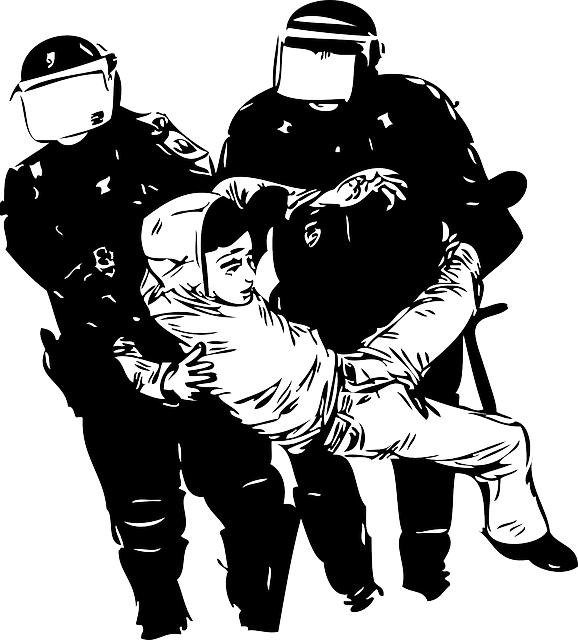Criminal Defense Attorneys are key navigators in the Real Estate Litigation Process, utilizing strategic defenses, evidence analysis, and legal loopholes to achieve favorable outcomes. This process involves investigation, charging, legal counsel, trial, and plea bargaining, with attorneys leveraging specialized techniques like GIS mapping for complex cases, ensuring fairness and positive verdicts, especially in high-stakes real estate disputes.
Criminal Defense Attorneys play a pivotal role in safeguarding individuals’ rights within the legal system. This article offers an insightful guide into their multifaceted responsibilities, demystifying the intricate process of criminal defense. We explore key aspects from understanding the client’s situation to crafting robust strategies and analyzing evidence. Furthermore, we delve into negotiation tactics, plea bargaining, and trial preparation, providing a comprehensive overview similar to a real estate litigation process explained—each step critical in ensuring justice and protecting legal rights.
- Understanding Criminal Defense Attorneys' Role
- The Legal Process for Criminal Cases
- Building a Strong Defense Strategy
- Evidence Collection and Analysis Techniques
- Negotiation, Plea Bargaining, and Trial Preparation
Understanding Criminal Defense Attorneys' Role
Criminal Defense Attorneys play a pivotal role in navigating the intricate Real Estate Litigation Process. Their expertise lies in protecting the rights of individuals and businesses involved in real estate transactions that have gone awry, whether due to contract disputes, property damage, or allegations of fraud. These attorneys are well-versed in local laws and regulations, ensuring their clients receive fair representation.
Beyond handling white collar and economic crimes, Criminal Defense Attorneys strive for achieving extraordinary results by employing strategic defense mechanisms. They meticulously examine evidence, challenge witness testimonies, and leverage loopholes to mitigate charges or secure favorable outcomes. An unprecedented track record of success is often a testament to their skill, dedication, and unwavering commitment to protecting their clients’ interests throughout the legal process.
The Legal Process for Criminal Cases
The legal process for criminal cases can be complex and varies slightly depending on jurisdiction, but it generally follows a structured path designed to ensure fairness and due process for all parties involved. It begins with an investigation, where law enforcement gathers evidence and interviews witnesses related to the alleged crime. This stage is crucial for building a strong case for both sides. If sufficient evidence is found, charges are filed against the accused by a prosecutor, who represents the state or government.
The defendant then has the right to legal counsel, which can be provided by a public defender or hired through private means. For his clients facing general criminal defense, this attorney will advocate for their rights and construct a robust defense strategy. The case proceeds to trial where both sides present their evidence and arguments before a judge or jury. This is where corporate and individual clients can find their fates decided, with the outcome based on the strength of their legal representation and the merits of the case.
Building a Strong Defense Strategy
A successful criminal defense strategy is akin to navigating a complex legal landscape, where each case presents unique challenges and opportunities. Criminal Defense Attorneys play a pivotal role in crafting robust defenses tailored to their clients’ specific circumstances. This process involves meticulous investigation, gathering compelling evidence, and identifying potential weaknesses in the prosecution’s case. By employing strategic tactics, lawyers can ensure that their clients receive fair treatment within the legal system.
In addition to these measures, a proactive approach includes exploring alternative solutions like plea bargaining or diversion programs, which might lead to avoiding indictment altogether. This is particularly relevant when considering the impact on an individual’s future, especially in high-stakes cases involving real estate litigation and its effects on philanthropic and political communities. Ultimately, the goal is to achieve extraordinary results by leveraging legal expertise, strategic planning, and a deep understanding of the court process.
Evidence Collection and Analysis Techniques
In general criminal defense, evidence collection and analysis techniques play a crucial role in navigating the complex legal landscape. Skilled attorneys understand that the proper handling and interpretation of evidence can significantly sway the outcome of a case. This involves meticulous attention to detail during all stages of the investigative and enforcement process. From gathering physical evidence at the scene to examining digital forensics, each step must be conducted with precision and adherence to legal protocols.
In real estate litigation, these techniques might overlap but are often tailored to specific issues. For instance, in a dispute over property boundaries, soil sampling and geographic information systems (GIS) mapping can provide crucial data. Conversely, in white-collar crime cases, financial analysts employ sophisticated tools to trace suspicious transactions, offering insights that may be key to the defense strategy. Ultimately, the effective use of these evidence collection and analysis methods not only strengthens the respective business case but ensures a fair and just general criminal defense process.
Negotiation, Plea Bargaining, and Trial Preparation
In the realm of criminal defense, attorneys play a pivotal role in guiding their clients through complex legal processes. One of the key aspects is negotiation, which often serves as a powerful tool to achieve favorable outcomes without proceeding to trial. Skilled defense lawyers are adept at navigating these discussions, ensuring their clients’ rights are protected while exploring options for resolution. Plea bargaining, a strategic component of this process, allows defendants to avoid the rigors of a full-scale trial by agreeing to plead guilty to a lesser charge or accept a negotiated sentence.
Trial preparation is another critical phase where Criminal Defense Attorneys excel. They meticulously build their cases, gathering evidence and interviewing witnesses to present a compelling defense strategy. This involves a deep understanding of the legal system, including all stages of the investigative and enforcement process, which is crucial for mounting a winning challenging defense verdicts, especially in high-stakes cases. By strategically preparing and executing these phases, attorneys increase their chances of securing positive outcomes for their clients.
Criminal defense attorneys play a pivotal role in navigating the complex legal landscape for those facing criminal charges. By understanding their crucial duties, from unraveling evidence to strategizing plea bargains, individuals can ensure they receive the robust representation needed to protect their rights and achieve the best possible outcome. Just as the real estate litigation process requires meticulous attention to detail and strategic planning, so does the defense of criminal cases, ultimately safeguarding the freedom and future prospects of those involved.






